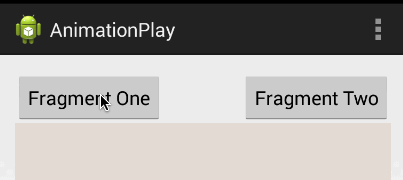How should you implement the sort of sliding that for example the Honeycomb Gmail client uses?
开发者_StackOverflow社区Can TransactionManager handle this automatically by adding and removing the Fragments, it's kind of difficult to test this due to the emulator being a slideshow :)
To animate the transition between fragments, or to animate the process of showing or hiding a fragment you use the Fragment Manager to create a Fragment Transaction.
Within each Fragment Transaction you can specify in and out animations that will be used for show and hide respectively (or both when replace is used).
The following code shows how you would replace a fragment by sliding out one fragment and sliding the other one in it's place.
FragmentTransaction ft = getFragmentManager().beginTransaction();
ft.setCustomAnimations(R.anim.slide_in_left, R.anim.slide_out_right);
DetailsFragment newFragment = DetailsFragment.newInstance();
ft.replace(R.id.details_fragment_container, newFragment, "detailFragment");
// Start the animated transition.
ft.commit();
To achieve the same thing with hiding or showing a fragment you'd simply call ft.show or ft.hide, passing in the Fragment you wish to show or hide respectively.
For reference, the XML animation definitions would use the objectAnimator tag. An example of slide_in_left might look something like this:
<?xml version="1.0" encoding="utf-8"?>
<set>
<objectAnimator xmlns:android="http://schemas.android.com/apk/res/android"
android:propertyName="x"
android:valueType="floatType"
android:valueFrom="-1280"
android:valueTo="0"
android:duration="500"/>
</set>
If you don't have to use the support library then have a look at Roman's answer.
But if you want to use the support library you have to use the old animation framework as described below.
After consulting Reto's and blindstuff's answers I have gotten the following code working.
The fragments appear sliding in from the right and sliding out to the left when back is pressed.
FragmentManager fragmentManager = getSupportFragmentManager();
FragmentTransaction transaction = fragmentManager.beginTransaction();
transaction.setCustomAnimations(R.anim.enter, R.anim.exit, R.anim.pop_enter, R.anim.pop_exit);
CustomFragment newCustomFragment = CustomFragment.newInstance();
transaction.replace(R.id.fragment_container, newCustomFragment );
transaction.addToBackStack(null);
transaction.commit();
The order is important. This means you must call setCustomAnimations() before replace() or the animation will not take effect!
Next these files have to be placed inside the res/anim folder.
enter.xml:
<?xml version="1.0" encoding="utf-8"?>
<set>
<translate xmlns:android="http://schemas.android.com/apk/res/android"
android:fromXDelta="100%"
android:toXDelta="0"
android:interpolator="@android:anim/decelerate_interpolator"
android:duration="@android:integer/config_mediumAnimTime"/>
</set>
exit.xml:
<set>
<translate xmlns:android="http://schemas.android.com/apk/res/android"
android:fromXDelta="0"
android:toXDelta="-100%"
android:interpolator="@android:anim/accelerate_interpolator"
android:duration="@android:integer/config_mediumAnimTime"/>
</set>
pop_enter.xml:
<set>
<translate xmlns:android="http://schemas.android.com/apk/res/android"
android:fromXDelta="-100%"
android:toXDelta="0"
android:interpolator="@android:anim/decelerate_interpolator"
android:duration="@android:integer/config_mediumAnimTime"/>
</set>
pop_exit.xml:
<?xml version="1.0" encoding="utf-8"?>
<set>
<translate xmlns:android="http://schemas.android.com/apk/res/android"
android:fromXDelta="0"
android:toXDelta="100%"
android:interpolator="@android:anim/accelerate_interpolator"
android:duration="@android:integer/config_mediumAnimTime"/>
</set>
The duration of the animations can be changed to any of the default values like @android:integer/config_shortAnimTime or any other number.
Note that if in between fragment replacements a configuration change happens (for example rotation) the back action isn't animated. This is a documented bug that still exists in the rev 20 of the support library.
I'd highly suggest you use this instead of creating the animation file because it's a much better solution. Android Studio already provides default animation you can use without creating any new XML file. The animations' names are android.R.anim.slide_in_left and android.R.anim.slide_out_right and you can use them as follows:
fragmentTransaction.setCustomAnimations(android.R.anim.slide_in_left, android.R.anim.slide_out_right);
FragmentManager fragmentManager = getSupportFragmentManager();
FragmentTransaction fragmentTransaction = fragmentManager.beginTransaction();
fragmentTransaction.setCustomAnimations(android.R.anim.slide_in_left, android.R.anim.slide_out_right);
fragmentManager.addOnBackStackChangedListener(this);
fragmentTransaction.replace(R.id.frame, firstFragment, "h");
fragmentTransaction.addToBackStack("h");
fragmentTransaction.commit();
Output:

My modified support library supports using both View animations (i.e. <translate>, <rotate>) and Object Animators (i.e. <objectAnimator>) for Fragment Transitions. It is implemented with NineOldAndroids. Refer to my documentation on github for details.
As for me, i need the view diraction:
in -> swipe from right
out -> swipe to left
Here works for me code:
slide_in_right.xml
<set xmlns:android="http://schemas.android.com/apk/res/android">
<translate android:fromXDelta="50%p" android:toXDelta="0"
android:duration="@android:integer/config_mediumAnimTime"/>
<alpha android:fromAlpha="0.0" android:toAlpha="1.0"
android:duration="@android:integer/config_mediumAnimTime" />
</set>
slide_out_left.xml
<set xmlns:android="http://schemas.android.com/apk/res/android">
<translate android:fromXDelta="0" android:toXDelta="-50%p"
android:duration="@android:integer/config_mediumAnimTime"/>
<alpha android:fromAlpha="1.0" android:toAlpha="0.0"
android:duration="@android:integer/config_mediumAnimTime" />
</set>
transaction code:
inline fun FragmentActivity.setContentFragment(
containerViewId: Int,
backStack: Boolean = false,
isAnimate: Boolean = false,
f: () -> Fragment
): Fragment? {
val manager = supportFragmentManager
return f().apply {
manager.beginTransaction().let {
if (isAnimate)
it.setCustomAnimations(R.anim.slide_in_right, R.anim.slide_out_left)
if (backStack) {
it.replace(containerViewId, this, "Fr").addToBackStack("Fr").commit()
} else {
it.replace(containerViewId, this, "Fr").commit()
}
}
}
}
I solve this the way Below
Animation anim = AnimationUtils.loadAnimation(this, R.anim.slide);
fg.startAnimation(anim);
this.fg.setVisibility(View.VISIBLE); //fg is a View object indicate fragment





![Interactive visualization of a graph in python [closed]](https://www.devze.com/res/2023/04-10/09/92d32fe8c0d22fb96bd6f6e8b7d1f457.gif)



 加载中,请稍侯......
加载中,请稍侯......
精彩评论